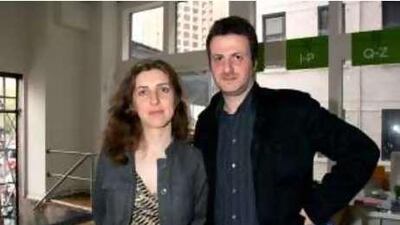Joana Hadjithomas and Khalil Joreige come as a team. The directing and writing duo work together making documentaries and art installations. They also do interviews together. When I meet them, they seem like an odd pairing; Hadjithomas is the more communicative and seemingly content, while the dark, handsome Joreige is brooding and happy to let Hadjithomas speak for them both. They were both born in Beirut in 1969 and have worked together as artists and filmmakers, shooting fiction films and documentaries since 1999. They are also both university professors in Beirut, she teaches screenwriting and he teaches aesthetics and experimental video. This year their new film Je Veux Voir (I Want to See) received its world premiere in Cannes and it is one of the nominees in the Arabic feature films category of the Muhr Awards at the Dubai International Film Festival.
It's their most ambitious project to date and like some of their previous work explores the boundaries between fact and fiction. It is immediately compelling because it stars the French legend Catherine Deneuve, playing herself, who demands to be taken to South Lebanon as she wants to see the devastation caused by the 2006 Israeli bombardment. Her guide on this unusual journey is the local artist Rabih Mroué.
Immediately, Hadjithomas makes clear how important Deneuve was for the project. "For this project it was only Catherine Deneuve that we were interested in for the role. If she said no, we wouldn't have made the film." It's a measure of the stature of the actress that the talk centres on her, despite the film dealing with a weighty and absorbing topic. It transpired that Deneuve was immediately amenable to doing the picture and in the movie the point is made that when you are in the presence of this cinematic great, everything becomes possible.
I wonder if there is anything the icon would not do, and after Hadjithomas jumps in with a firm "No," Joreige comes out of his shell, stating, "We chose her because we knew she was courageous and confident. I was surprised as she didn't know where she was going to go with us when we took the trip. She just went with us." Sous Les Bombes (Under the Bombs), which won a Gold Muhr Award, also used the crushed buildings of South Lebanon as a backdrop and I ask the pair if they see their film as part of a movement or if they were influenced by Philippe Aractingi's film. "No," Hadjithomas replies, "because the film wasn't finished when we made our film and it's not the same way of dealing with the difference between documentary and fiction in any case. We are asking what can cinema do and explain after a war? Under the Bombs is much more fictional."
The directors clearly want to make the audience think that what they are watching is a documentary. It isn't. The film starts with Deneuve meeting the filmmakers before she has to attend a film ceremony. This is all fiction. They filmed this scene and had a party on the night that Deneuve arrived on set. The directors explain that Mroué wasn't allowed to come to the party because they wanted to film his initial meeting with his co-star. Hadjithomas explains: "When they met, we even forbade Mroué, who doesn't speak very good French, to speak in English, because he's not the audience guide. He is there for Deneuve." Mroué was so amazed at being in the presence of the Belle De Jour star that he even forgot all the French that he'd been learning.
Humorous anecdotes aside, I wonder aloud whether the audience will feel cheated when they discover that the directors are trying to dupe them into thinking that what happens on the screen is real and not fiction. Joreige says, "It's true, there are specific scenes where they will feel cheated. The sequence with the mines where we made it appear as if Deneuve's life is in danger is one such scene. Exploring this limit is something that really interests us."
Hadjithomas doesn't seem to agree with her partner and adds, "No one can say that it was a fiction because it was not." She then explains how they approach documentary filmmaking. "Our documentaries are not classical documentaries, they are more like artistic essays. We consider this film an adventure. It's very interesting how it happened. We wrote it and we didn't give the actors the script but when we were shooting we tried to get them to have some sort of chemical reaction. We'd already done the trip several times and we just put Catherine and Rabih into situations that had already happened to us. We then looked at how they reacted to this stimuli. It's amazing because what happened was different but also exactly the same."
The post-war aesthetic and method of storytelling have clear parallels to Italian neo-realism, although Joreige plays down the similarities. "Italian neo-realism is part of our history, but what was really important for this movie were our experiences away from cinema, our experiences as artists and work for galleries, because everything we do is a set-up." The pair clearly view themselves as artists rather than filmmakers. It just so happens that the best way to investigate this particular idea was through cinema, rather than photographs, an art installation, or writing books. The final absorbing result on-screen is the proof that they made the right choice.
Je veux voir plays today at 12.30pm at Mall of Emirates, Cinestar, Cinema 4. Buy tickets at @email:www.dubaifilmfest.com


